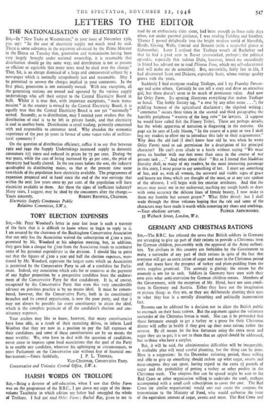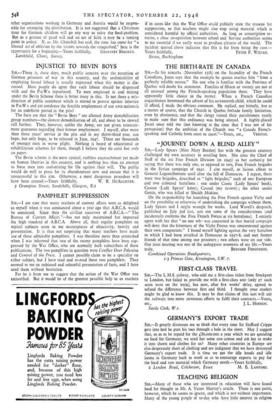GERMANY AND CHRISTMAS RATIONS
SIR,—The B.B.C. has released the news that British soldiers in Germany are arranging to give up part of their rations to provide a Christmas treat for German children, presumably with the approval of the Army authori- ties. Yet civilians in this country are forbidden by the Government to make a surrender of any part of their rations in spite of the fact that everyone will get an extra ration of sugar and meat in the Christmas period and that many have the prospect of turkey and plum-pudding from the extra supplies promised. The anomaly is glaring; the reason for the anomaly is not far to seek. Soldiers in Germany have seen with their own eyes what semi-starvation for German children means. Members of the Government, with the exception of Mr. Hynd, have not seen condi- tions in Germany and Austria. Either they have not the imagination to picture things as they are, or they are deliberately shutting their eyes to what they fear is a morally disturbing and politically inconvenient fact.
Reasons can be adduced for a decision not to allow the British public to encroach on their basic rations. But the argument against the voluntary surrender of the Christmas bonus is weak. Nor can it be pretended that those fortunate enough to get a turkey or a goose for their Christmas dinner will suffer in health if they give up their meat ration; rather the reverse. By all means let the less fortunate enjoy the extra meat and sugar they are to get; it is not to them that an appeal should be addressed, but to those who have a surplus.
But, it will be said, the administrative difficulties will be insuperable. A workable plan will need careful planning, but the thing can be done. Here is a suggestion: In the December rationing period, those willing and able to give up something should reckon up what sugar, sweets and meat-coupons they can spare, having regard to the extra 54 pounds of sugar and the probability of getting a turkey or other poultry in the Christmas week. The coupons that can be spared might be sent to the Red Cross or other organisation willing to undertake the work, perhaps accompanied with a small cash subscription to cover the cost. The Red Cross (or similar organisation) would sort and count the coupons for transmission to the Ministry of Food, who would authorise the issue of the equivalent amount of sugar, sweets and meat. The Red Cross and other organisations working in Germany and Austria would be respon- sible for arranging the distribution. It is not suggested that a Christmas treat for German children will go any way to solve the food-problem. But as a gesture of good will and an act of faith it may be a turning point in policy. If, as Mr. Churchill has said, the time has come for "a blessed act of oblivion by the victors towards the vanquished," here is the
opportunity for a beginning.—Yours faithfully, GEOFFREY BRACKEN. Larch field, Churt, Surrey.



































 Previous page
Previous page